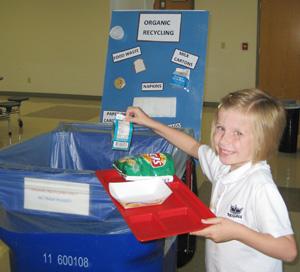
By Celine Klosterman
IOWA CITY — Each weekday at Regina Catholic Education Center, 760 empty milk containers, hundreds of napkins and countless scraps of food are spared from the trash.
Instead, Regina is sending those items and other organic waste to the Iowa City Landfill and Recycling Center to be turned into compost. In August, the school became the first K-12 educational institution in Johnson County to do so.
Regina has been sending about 160 gallons of organic waste per day to the recycling center for composting, said Missy Aitchison, a parent who initiated the school’s effort. Since spring, Regina has switched from plastic milk containers to less-expensive cardboard cartons made with a compostable, vegetable-based wax; replaced plastic eating utensils with silverware; and made separate trash bins available for organic refuse.
“We hope that if we teach students environmental stewardship at a young age, it will become a lifelong habit,” Aitchison said.
The mother of a second-grader and preschooler, she was inspired to promote such stewardship after noticing a lack of recycling containers at a Regina event last year. “When I’ve eaten with my son at school, the plastic milk bottles were just thrown in the trash.”
So she spoke with then-President Carol Trueg, who invited her to speak at a school administrators’ meeting. After that meeting, Aitchison asked Jennifer Jordan, recycling coordinator for the landfill and recycling center, about taking part in Iowa City’s composting program.
Jordan said she was impressed with Aitchison’s follow-through. Beginning on the first day of school Aug. 18, parent volunteers helped students sort compostable food, cardboard and paper waste from non-compostable plastic wrappers, chip bags and Styrofoam dishes left on trays after lunch.
Johnson County Refuse picks up Regina’s organic waste and takes it to the recycling center. The school expects that the cost of paying the company to do so will be offset by Regina’s reduced use of trash pickup services, said Alan Opheim, the school’s director of finance and operations.
At the recycling center Regina’s organic waste will spend six to eight months turning into compost, which will then be sold, Jordan said.
The process helps protect the environment. Food scraps in a landfill don’t get the oxygen they need to break down quickly, so they release methane, a greenhouse gas 21 times worse than carbon dioxide, Jordan said.
That’s one reason the recycling center started accepting food for its composting program in 2007. The University of Iowa and New Pioneer Food Co-op also send waste to be composted, and a few K-12 schools have asked about taking part after learning about Regina’s efforts, Jordan said.
To encourage recycling outside the lunchroom, Regina has placed educational signs throughout the building. The school also has ordered an additional 85 recycling bins for paper in classrooms and offices, plus four portable “recycling centers” with containers for plastic, paper and trash. Financial assistance from the Iowa Department of Natural Resources’ Solid Waste Alternative Program made those purchases possible, Aitchison said.
“God gave us one world,” she said. “It’s up to us to keep it clean and beautiful for our children.”








